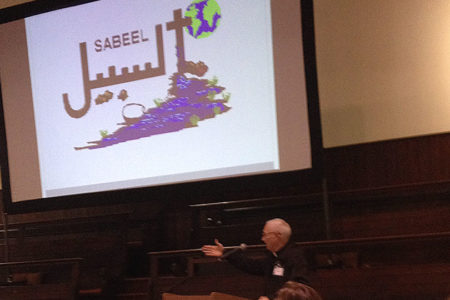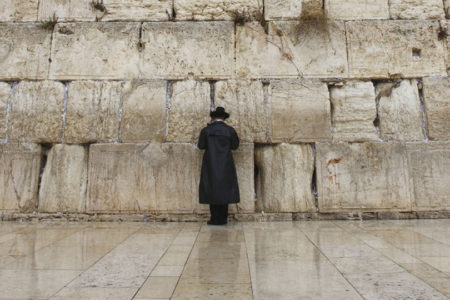Evangelicals Against Israel
Editor’s Note: This article was originally published in the spring 2014 issue of The Middle East Quarterly (meforum.org). We want to thank David Brog for giving us permission to run it and edit it to accommodate our space.
A mere decade ago, Christian Zionism was seen as an emerging force in American politics. As if out of nowhere, a block of 50 million to 100 million friends of Israel were poised to enter the national debate and safeguard the U.S.-Israel relationship for generations to come. Evangelical love for Israel appeared so solid the only debate within the Jewish community was whether or not to “accept” it.
How quickly things change. The days of taking such support for granted are over. As they are increasingly confronted with an evangelical-friendly, anti-Israel narrative, more and more of these Christians are turning against the Jewish state.1
Prior to the 1967 Six-Day War, mainline Protestant denominations were among Israel’s most reliable American supporters. So Israel’s opponents targeted these denominations with mainline-friendly, anti-Israel messages. Many mainline Protestants still support the Jewish state today. But to the extent that they act corporately regarding Israel, it is to divest from it.
Meanwhile, Palestinian Christians and their American sympathizers are successfully promoting a narrative aimed at turning the rising generation of evangelicals against Israel. As a result, more young leaders are moving toward neutrality in the conflict, while others are overtly criticizing Israel. Questioning Christian support for Israel is fast becoming a key way for Millennials (roughly ages 18 to 30) to demonstrate their Christian compassion and political independence. In short, this population is in play.
There is nothing new about the efforts to drive a wedge between America’s evangelicals and Israel. Many in the anti-Israel camp have been working for years to do exactly that. Anti-Israel Palestinian Christians, such as Sami Awad and Naim Ateek, have traveled the country telling American Christians about Israeli “oppression.” Left-leaning evangelicals, such as Jim Wallis, Tony Campolo, and Serge Duss, have echoed this narrative in their corner of the Christian world. Duss’s sons, Brian and Matt, have worked diligently to mainstream their father’s views within the fields of Christian philanthropy and Democratic Party policy-making, respectively.
Until the past few years, however, there was little reason to believe these individuals were having much influence. Almost every significant evangelical leader who took a position on the issue came out squarely behind the Jewish state.
Now the situation is changing. With every passing month, more evidence emerges that anti-Israel Christians are reaching beyond the evangelical left and influencing the mainstream. In particular, they are penetrating the evangelical world at its soft underbelly: the Millennial generation. These young believers are rebelling against what they perceive as the excessive biblical literalism and political conservatism of their parents. As they strive to imitate Jesus’ stand with the oppressed and downtrodden, they want to decide for themselves who is being oppressed in the Arab-Israeli conflict.
Whoever first defines the conflict for these young people will win lifelong allies.
Documentaries
The year 2010 saw a dramatic escalation in the anti-Israel camp’s use of film. No fewer than three major documentaries released that year attacked Christian support for Israel. Waiting for Armageddon was produced and directed by secular documentarians. But two other films—With God on Our Side and Little Town of Bethlehem—were made by Christians for Christians.
With God on Our Side was produced by Porter Speakman, a former Youth With A Mission2 (YWAM) activist; Little Town of Bethlehem was funded and produced by Mart Green, former chairman of the board of trustees of Oral Roberts University and heir to the Hobby Lobby arts and crafts stores fortune.
These films are masterpieces of deception. They feature compelling protagonists wandering earnestly through a Middle Eastern landscape in which all Arab violence, aggression, and rejectionism have been magically erased. Thus Israel’s security measures—from the security fence to Israel’s ongoing presence in the West Bank—appear like baffling persecutions that any decent person would condemn.
In November 2013, another anti-Israel documentary, The Stones Cry Out, was released. It also tailors its message to Christians. The film’s website laments, “All too often, media coverage of the conflict in Palestine has framed it as a fight between Muslims and Jews.” The not-too-subtle goal of The Stones Cry Out is to reframe the conflict as a fight between Christians and Jews.
These one-sided narratives may be sowing the seeds of future hate.
Christian Colleges and Conferences
The effort to delegitimize Israel on America’s secular college campuses has almost become cliché. The annual Israel apartheid weeks and repeated divestment campaigns target everything from university pension funds to cafeteria hummus. But many observers do not realize there is a major effort to demonize Israel on Christian campuses.
Perhaps the most troubling example comes from Wheaton College in Illinois, commonly referred to as the “evangelical Harvard.” Some of the most prominent church leaders in America have graduated from Wheaton, including the Rev. Billy Graham; U.S. Sen. Dan Coats (R-IN); and George W. Bush’s former speechwriter, Michael Gerson.
Wheaton is also the home of Gary Burge, one of America’s most prominent anti-Israel evangelicals. Burge travels the world accusing the Jewish state of the worst of crimes and engaging in a mockery of Judaism that borders on anti-Semitism.3
When Christians United for Israel (CUFI) announced plans to hold an event at Wheaton in January 2009, Burge went on the offensive. CUFI’s student members came under such intense pressure they moved their event off-campus. There would be no pro-Israel event at the evangelical Harvard.
Another Christian school, Oral Roberts University (ORU), has deep conservative Christian roots. Oral Roberts himself was a Pentecostal televangelist and a strong friend of Israel. But things may be changing at ORU. The current vice chair of its board of trustees is Mart Green. He reportedly “saved” ORU with a $70 million cash infusion. In January 2013, the board elected Billy Wilson as the university’s new president. A few months later, Wilson was named as a 2014 speaker at the leading anti-Israel Christian conference, “Christ at the Checkpoint.”
Bethel University in Minnesota is likely more representative of the direction America’s Christian colleges are taking. Bethel’s leaders are neither leading nor funding the effort to delegitimize Israel but are the products thereof. Like many Christian schools, Bethel emphasizes racial reconciliation and cultural openness and provides opportunities for its students to study abroad. In 2010, Bethel’s President Jay Barnes and his wife, Barb, visited Israel and the Palestinian Authority (PA) to explore the prospect of building a study-abroad program there. In Bethlehem they were exposed to the standard Christian anti-Israel narrative.
Shortly after her return, Barb Barnes posted a poem on the university’s website that showed she bought into the one-sided, anti-Israel themes. In October 2012, President Barnes hosted a “Hope for the Holy Land” evening at Bethel, a blame-Israel speaking tour featuring Sami Awad, Lynne Hybels, and other long-standing Christian critics of Israel.
One need not be a student to hear the blame-Israel narrative. In recent years, the number and strength of Christian conferences focusing entirely or partially on criticizing Israel has grown.
Since its founding in 1979, Bethlehem Bible College in the West Bank has been a leading source of the anti-Israel Christian narrative. In 2010 it launched a biennial conference called “Christ at the Checkpoint.” The conference name and the photo of the Israeli security fence that forms its logo invoke the increasingly popular meme that Jesus was a Palestinian who would be suffering under Israeli occupation today, much as He suffered under Roman occupation millennia ago.
In 2010 the conference attracted 250 Christian leaders and activists; in 2012, more than 600 attended, including evangelical megachurch Pastor Joel Hunter and Lynne Hybels, wife of megachurch Pastor Bill Hybels.
The days when one had to travel to Bethlehem to hear such anti-Israel voices are now over. “Christ at the Checkpoint” is being shared at major Christian conferences in the United States, including those organized by Empowered21 and Catalyst.
Empowered21, the preeminent gathering of Pentecostal/Charismatic Christians, provides a troubling example of this trend. Its leadership is a who’s who of Pentecostal and Charismatic luminaries from around the world, including many longstanding friends of Israel. The leading critic of Israel among these leaders is Mart Green; and the 2012 conference in Virginia included a talk by Sami Awad and a screening of Green’s film, Little Town of Bethlehem.
Troubling developments are also taking place at the annual Catalyst conference. First launched in 1999, Catalyst has quickly grown into the largest gathering of young evangelical leaders in America. More than 100,000 have made the annual trek to Atlanta, Georgia, to participate since its inception. Additional Catalyst events are now held in Florida, Texas, and California.
In the past, Catalyst studiously avoided the Arab-Israeli conflict. In 2012, however, Lynne Hybels was invited to address “Peacemaking in Israel/Palestine.” No one was asked to provide a pro-Israel perspective. As journalist Jim Fletcher observed after attending, “In dozens of random conversations, I noted that Millennials…expressed solidarity with the Palestinians and annoyance with Israel. This is a seismic shift in the American church and a serious threat to Israel’s one traditional area of support.”4
In addition to speaking at major conferences, anti-Israel speakers like Burge, Awad, Hybels, and Stephen Sizer tour churches across the country. The flyer for a September 2013 evening with Burge included three lies that form the core of the new Christian anti-Zionism:
- Zionists in Israel have created a state that wants racial purity.
- Many Zionists want native-born Christians to leave Israel.
- Christian Zionists in America support Israel because they believe this will accelerate the Second Coming of Christ.
Trips to ‘Israel-Palestine’
A growing number of organizations are bringing Christian leaders, influencers, and students to visit “Israel-Palestine.” These trips are well marketed and seek out mainstream evangelicals by claiming to be both pro-Israeli and pro-Palestinian—or simply “pro-people”—but never anti-Israel. Yet they focus on Palestinian suffering and blame Israel alone for it.
The Telos Group, founded in 2009 and funded by George Soros,5 is typical of these new organizations. Run by a savvy team professing a moderate agenda, Telos promotes itself as “a leading organization of America’s emerging pro-Israeli, pro-Palestinian, pro-American, pro-peace movement.”6 Their tours take visitors to Israel and the PA where they meet with both Israelis and Palestinians. What could be more evenhanded?
Yet these tours are carefully calibrated to teach that Israeli policy is the source of Israeli and Arab suffering and the only real barrier to peace. The Palestinian speakers include extreme critics of Israel, such as Bethlehem Pastor Mitri Raheb and Archbishop Elias Chacour (both featured prominently in The Stones Cry Out). The Israeli speakers, while not as extreme, are stalwarts of the far left who blame Israel for the region’s problems. A brief visit with an Israeli right-winger confirms this one-sided narrative. Telos organizes approximately 15 of these trips every year.7
Another recent arrival on the scene is the Global Immersion Project. Founded in 2011, the project seeks to “cultivate everyday peacemakers through immersion in global conflict.”8 But so far the only conflict they study is that between Israelis and Palestinians, and the only trips they take are to “Israel-Palestine.”
These newcomers have joined an old stalwart, the Holy Land Trust. Founded in 1998 by Palestinian-Christian activist Sami Awad, the organization claims to promote nonviolent solutions to the conflict with Israel. However, Awad has stated clearly on his blog that nonviolence is “not a substitute for the armed struggle. This is not a method for normalization with the occupation. Our goal is to revive the popular resistance until every person is involved in dismantling the occupation.”9
The Holy Land Trust promotes a strongly biased version of history in which Israel alone is to blame for the absence of peace, and it shares this message with everyone.
It is unlikely older evangelicals who support Israel will abandon it en masse. There is a real danger, however, that these films, conferences, and campus movements will turn the younger generation against Israel.
Most of the evangelicals who dominated Christian political activism for the past few decades—men like Jerry Falwell, Pat Robertson, and Francis Schaeffer—were vocal supporters of the Jewish state. Although their children may share this perspective, they talk about it less. In fact, Schaeffer’s son Frank has become a vocal critic of “the largely unchallenged influence of Christian Zionism.”10
Making matters worse, a cadre of rising young evangelical stars who are bonding on trips to Israel and the PA are pushing their peers away from the Jewish state. This is a largely well-coiffed and fashionably dressed bunch, dedicated to marketing Christianity to a skeptical generation by making it cool, compassionate, and less overtly political. Questioning support for Israel and sympathizing with the Palestinians is fast becoming a hallmark of this clique.
This generational divide is best highlighted by the example of Christian publisher Steven Strang and his son Cameron. Steven Strang publishes Charisma, a leading evangelical monthly with a consistently pro-Israel perspective.
Cameron publishes Relevant, a popular magazine among Millennial evangelicals. It claims to “reach about 2,300,000 twenty- and thirtysomething Christians a month” through its print and online publications.11
Less than a decade ago, Relevant was as pro-Israel as Charisma. Then Lynne Hybels took Cameron Strang to Israel and the Palestinian territories, and everything changed. During Israel’s 2008–09 Operation Cast Lead in Gaza, Relevant published an article titled “Is Israel Always Right?” which dispensed with any balanced analysis of urban counterterror operations. The author concluded, “When I examine Israel’s choices like I would that of any other nation, I find myself appalled that they’re not doing more to protect the innocents [in Gaza].”12
When Israel confronted Hamas again in November 2012, Relevant published an article by Jon Huckins, a cofounder of the Global Immersion Project, that was an extended exercise in moral relativism, noting the suffering on each side without attributing blame. Huckins never once criticized Hamas; but he did take a thinly veiled swipe at Christian Zionists by blasting the “hateful stereotyping, racism, and violent response [to events in Gaza] being disseminated by Christians.”13
Relevant’s May/June 2012 cover featured Donald Miller, author of the New York Times bestseller Blue Like Jazz (2003), which was made into a 2012 movie. In August 2008, Miller delivered the first night’s closing prayer at the Democratic National Convention. He is considered a rising star among America’s 20-something evangelicals who comprise many of his 189,000 Twitter followers.
Miller visited Israel and the Palestinian territories with Strang and has since embraced the anti-Israel narrative. On November 12, 2012, Miller blogged “The Painful Truth About the Situation in Israel,”14 repeating a number of outrageous lies about Israel that he likely heard during his visit.
The Response
Freeze the frame today, and the pro-Israel side is still far ahead in the battle for the hearts and minds of America’s evangelicals. CUFI alone has more than 1.6 million members. But anti-Israel Christians are on a roll. Though small in number, they seem to have extensive funds and are reaching an ever-expanding network of evangelicals in the United States.
The threat is not that these activists will turn the majority of American evangelicals into Israel haters. But they do not have to. All they have to do is teach a moral relativism that will neutralize them. The day that Israel is seen as the moral equivalent of Hamas is the day the evangelical community will cease giving meaningful support to the Jewish state.
Those who reject such facile moral equivalence must take this threat seriously. They cannot let the evangelical community go the way of the mainstream Protestant leadership. They must not forget that big lies must be confronted early and often. And they dare not ignore the fact that Israel’s enemies are telling extremely big lies to some extremely influential Christians—and telling them well.
ENDNOTES
- The term anti-Israel does not refer to merely criticizing Israel; almost every Israeli does that on a daily basis. Its use here signifies recounting a one-sided version of history in which Israel alone is to blame for Palestinian suffering, such as the repeated condemnation of Israeli security measures without a serious discussion of the violence that necessitates them.
- YWAM is a popular evangelical youth movement led by traditional, pro-Israel evangelicals.
- “Israeli Jews: The Impossible People at Christ at the Checkpoint,” CAMERA, Boston, MA, April 11, 2012 <camera .org/index.asp?x_context=2&x_outlet=118&x_article=2221>.
- Jan Markell, “When Social Justice Equals No Justice,” World Net Daily, October 19, 2012.
- Alexander H. Joffe, “Bad Investment: The Philanthropy of George Soros and the Arab-Israeli Conflict,” NGO Monitor, Jerusalem, May 2013, 50.
- “Our Story,” Telos Group, Washington, DC, accessed January 27, 2014 <telosgroup.org/about/our_story>.
- McKay Coppins, “New Evangelical Movement Seeks Split from Pro-Israel Line,” Buzzfeed, January 14, 2014,
- “Curious what our Learning Labs are all about?” Global Immersion Project, Walnut Creek, CA, September 12, 2013 <http://globalimmerse.org/get-a-taste-of-tgips-learning-lab>.
- Sami Awad, “Nonviolent Resistance: Wake up every day and ask yourself what you can do to resist the occupation,” Holy Land Trust, Bethlehem, January 23, 2007.
- Frank Schaeffer, “With God on Our Side—Christian Zionism Exposed,” The Huffington Post, November 9, 2010.
- “The Relevant Story,” Relevant (Winter Park, FL.), accessed January 27, 2014 <relevantmagazine.com/relevant-story>.
- Ed Gungor, “Is Israel Always Right?” Relevant, January 20, 2009.
- Jon Huckins, “How Should Christians Respond to the Middle East Crisis?” Relevant, November 19, 2012.
- Donald Miller, “The Painful Truth About the Situation in Israel,” Storyline Blog, November 19, 2012 <storylineblog .com/2012/11/19/the-painful-truth-about-the-situation-in-israel>.








